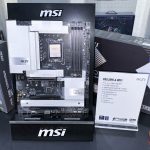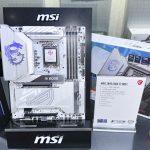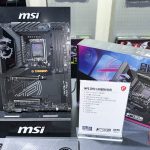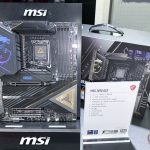KitGuru recently flew out to China where we met Ethan Yang, the vice president for MSI Shenzhen’s manufacturing plant. He gave us a tour of his factory facility just as they were going through the process of building the first Z890 Tomahawk motherboards, so we thought we'd bring our readers along for the ride!
Leo recently published a roundup of MSI Z890 motherboards, where he looked at the MSI PRO Z890-A WIFI, MAG Z890 Tomahawk WiFi, MPG Z890 Carbon WiFi, MEG UNIFY X and MEG Z890 ACE. Prior to filming that content, we were invited by MSI to visit their production facility in Shenzhen, China, to see exactly how these boards are made:
The complex itself is huge, as you might expect, and with strong security around the outside. When the plant first opened in 2001, it could house up to 12,000 workers. Nowadays, through increase efficiencies and the application of automation and Ai, MSI Shenzhen is down to just 3,000 workers – across all shifts. Yang told us that he expects to get this down to 1,500 in the near future.
So exactly how long does it take for a production line to be prepared and, once up and running, how long does it take to make one specific motherboard and how long does it take to switch from – say – a Z890 Tomahawk to a Z890 Carbon on the line itself?
Yang said that they tend to work in batches of 2,000 units at a time, that each board takes around 90 minutes to go from ‘plain PCB’ to ‘boxed and ready for sale’. Finally, switching products takes around 6 minutes.
As the plain PCBs arrive in the factory, the first station they hit is a solder paste printer. Yang explained that this machine lets them mask the motherboard in a precise way, so that later when the board goes through the solder path, they can control exactly what does and does not get connected.
The majority of components that will be installed on each motherboard actually come into the factory on a roll of tape, allowing the robotic manufacturing system to pick up each component and position it correctly on the motherboard. It is the role of the human operators to ensure they have enough tapes on standby and that they swap them out in time to reduce the chance of a production line having to stop.
In order for the soldering process to work perfectly, the board and everything on it must be brought up gently to a temperature of around 270 degrees. It's crucial that every part of the board is at the same temperature, if you want a successful solder.
Next we come to one of the automatic optical inspection machines, which can do a very detailed analysis of everything on the motherboard at this stage; this allows them to quickly and easily highlight any potential issues.
As we go along to the next section of surface mounting machines, Yang pointed out the second stage production line information screen showing which of the units are perfectly loaded and have plenty of spare components and which ones are getting to the point where they will need to be reloaded soon. Now that all of the surface mount components have been added to the board, it needs to go into a second oven.
After going through the second oven, each board is now inspected by a much more sophisticated unit that intelligently analyses everything that's been done on the board so far and tells the management team that everything's okay. Having seen all the surface mount parts of the process, we now get onto the machines that do insertion.
As you'd expect, there's another automated checking machine that will scan every part of the board looking for issues and defects that can be either fixed immediately or taken offline.
We've now moved to the first of a series of physical and electrical tests that are automatically carried out on the board. At this stage we're still missing the CPU mounting mechanism, which you can see being added here manually by human operator… …and it then goes into a robotic machine which will do up each screw to exactly the right pressure.
Then we're on to automated function tests where specialised machines will tell the operators if the board has been successful in its assembly. Operators can normally test 4 boards at a time like this, but the fact that this test is relatively slow means that they can have up to eight units being tested – by a single operator – all at once.
Discuss on our Facebook page HERE.
KitGuru says: Thanks to MSI for hosting us at their Shenzhen facility!
 KitGuru KitGuru.net – Tech News | Hardware News | Hardware Reviews | IOS | Mobile | Gaming | Graphics Cards
KitGuru KitGuru.net – Tech News | Hardware News | Hardware Reviews | IOS | Mobile | Gaming | Graphics Cards







